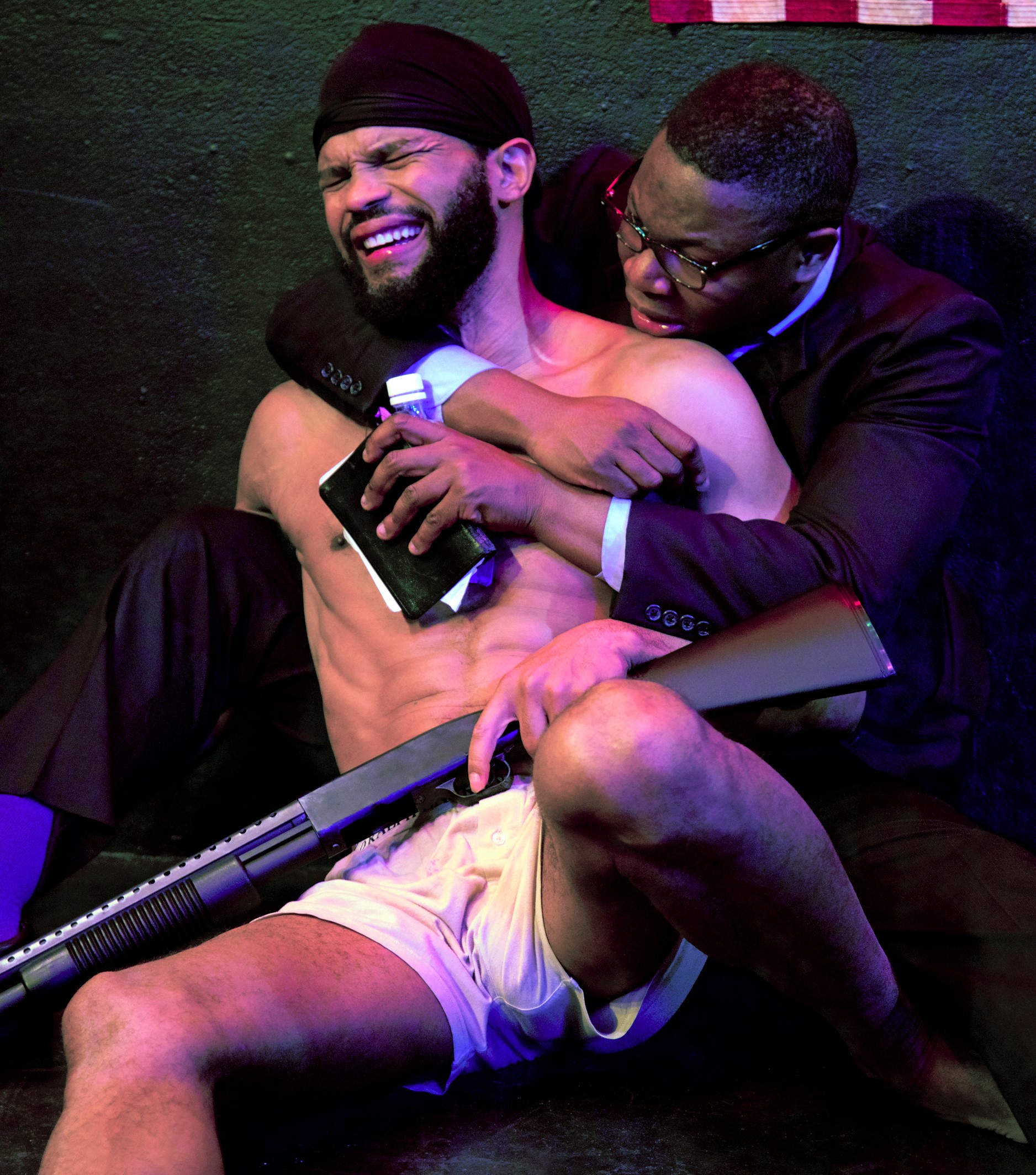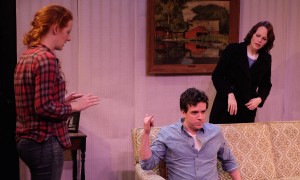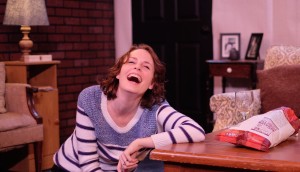Post-traumatic stress disorder (PTSD), familial conflict, crucifixions and redemption are at the forefront of family conflict in Master of the Crossroads. Paul Calderon’s play starts off on an elevated note when Yolanda, played by Sarah Kate Jackson, storms into the home of her ex-brother-in-law, Jim-Bo (Obi Abili), to plead with him for help with her husband Cornbread (Nixon Cesar), an aggressive veteran who was deployed to Afghanistan. Cornbread has taken a man hostage whom he has mistakenly thinks is an Arab.
Cornbread (Nixon Cesar, left) with Jim-Bo (Obi Abili) in Paul Calderon’s Master of the Crossroads. Top: Jim-Bo (Abili) having an intense moment with Yolanda (Sarah Kate Jackson).
Cornbread exhibits severe symptoms of PTSD, and Cesar (despite a tendency to excessive loudness) captures a range of emotions that one can only imagine a person suffering from this disorder could feel. Cornbread has turned to alcohol and drugs to escape the hauntings in his mind and sees redemption or sacrifice as the only way to move forward. His deterioration is displayed when he explains to his brother that he firmly believes that he has captured an actual Arab:
You tell me he a Spanish Man but no Spanish done spill outta his mouth! Sand Nigga jibber’s what spilling out. Sand nigga jibber! And I know sand nigga jibber when I hear it! Heard it often ‘nuff when I was over widdim and they jibbered and jabbered it till it done near drove me insane, even when some of them jibbering and jabbering were “friendly,” pretended to be on our side. Like this little bugger fucker, couldn’t have been more than twelve if a day. One sec we showing him how to use a broom stick for a baseball bat and the next BOOM!! Done blew hisself and about half dozen of us away with an IED.
The theme of redemption through sacrifice is woven tightly throughout play. The characters have sacrificed their minds and well-being for the sake of their country. Cornbread’s condition is getting worse, and it’s obvious as he plans to “sacrifice” his prisoner. A plot twist occurs with the revelation that Jim-Bo is also suffering from PTSD, and the savior becomes more dangerous. He uses his faith as a source of comfort and a grounding mechanism. As a churchgoing man, Jim-Bo tells Yolanda that Cornbread is “Unwillin’ to understand, that he our Christ!” Abili brings enthusiasm and intensity to Jim-Bo, portraying a scary darkness that has lingered inside his character for who knows how long until he snaps.
Jim-Bo (Abili) holding his brother Cornbread (Cesar). Photographs by David Zayas Jr.
His efforts to save the man his brother is holding captive are sidelined as he decides to cleanse the sins of his family through a sacrificial ceremony. Jim-Bo prepares by sawing wood, gathering nails, taking off his clothes, and locking up Cornbread, leading to a climactic, horrific scene as he tries to redeem his family from the demons inside their minds.
The set design by Calderon, who has also directed, is minimalistic, with key symbols displayed on the stage: the American flag, a statue resembling Jesus, and a wooden cross. The props are appropriately violent and intimidating. The lighting by Evan Louison works well with the encompassing theme of the play. It mimics the fog and anxiety associated with PTSD. The music and sounds, also by Louison, are at times terrifying and creepy while at other times meditative and ecclesiastical. With these components working harmoniously, the audience gets a glimpse of what the characters are struggling with day-to-day. Master of the Crossroads is harsh, dark and eerie to make a point about the poor mental health care that American veterans experience.
The Primitive Grace production of Master of the Crossroads plays through Feb. 9 at the Bridge Theater (at Shetler Studios, 244 West 54th St., between Seventh and Eighth Avenues) in Manhattan. Performances are at 8 p.m. Wednesday to Saturday. Tickets are available at primitivegrace.org. Note that this production contains nudity, racist language and graphic violence in an intimate setting.











